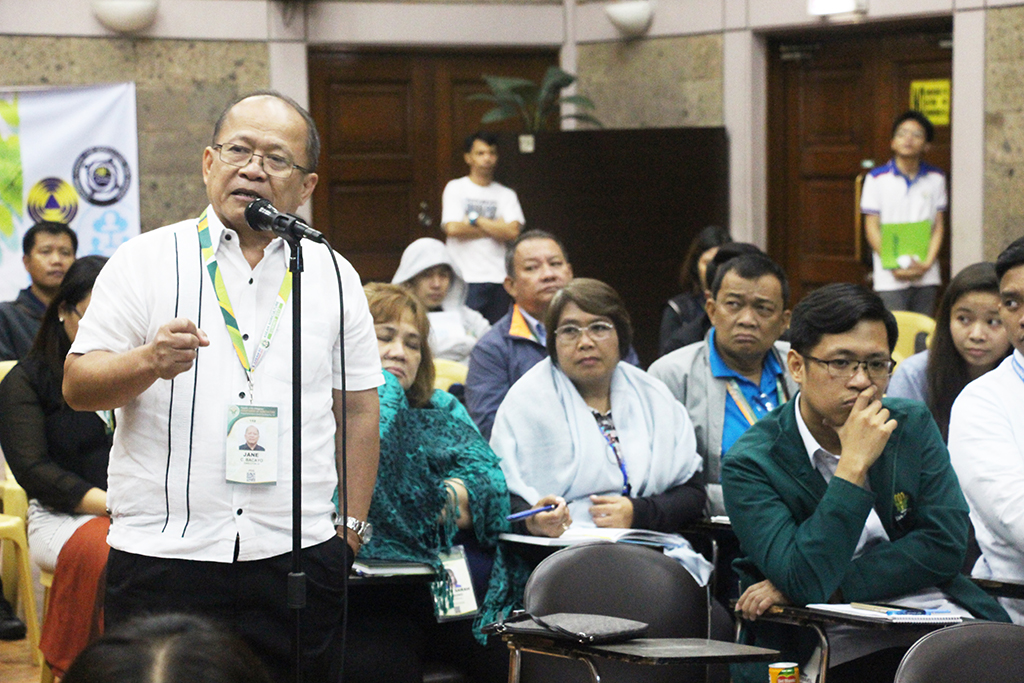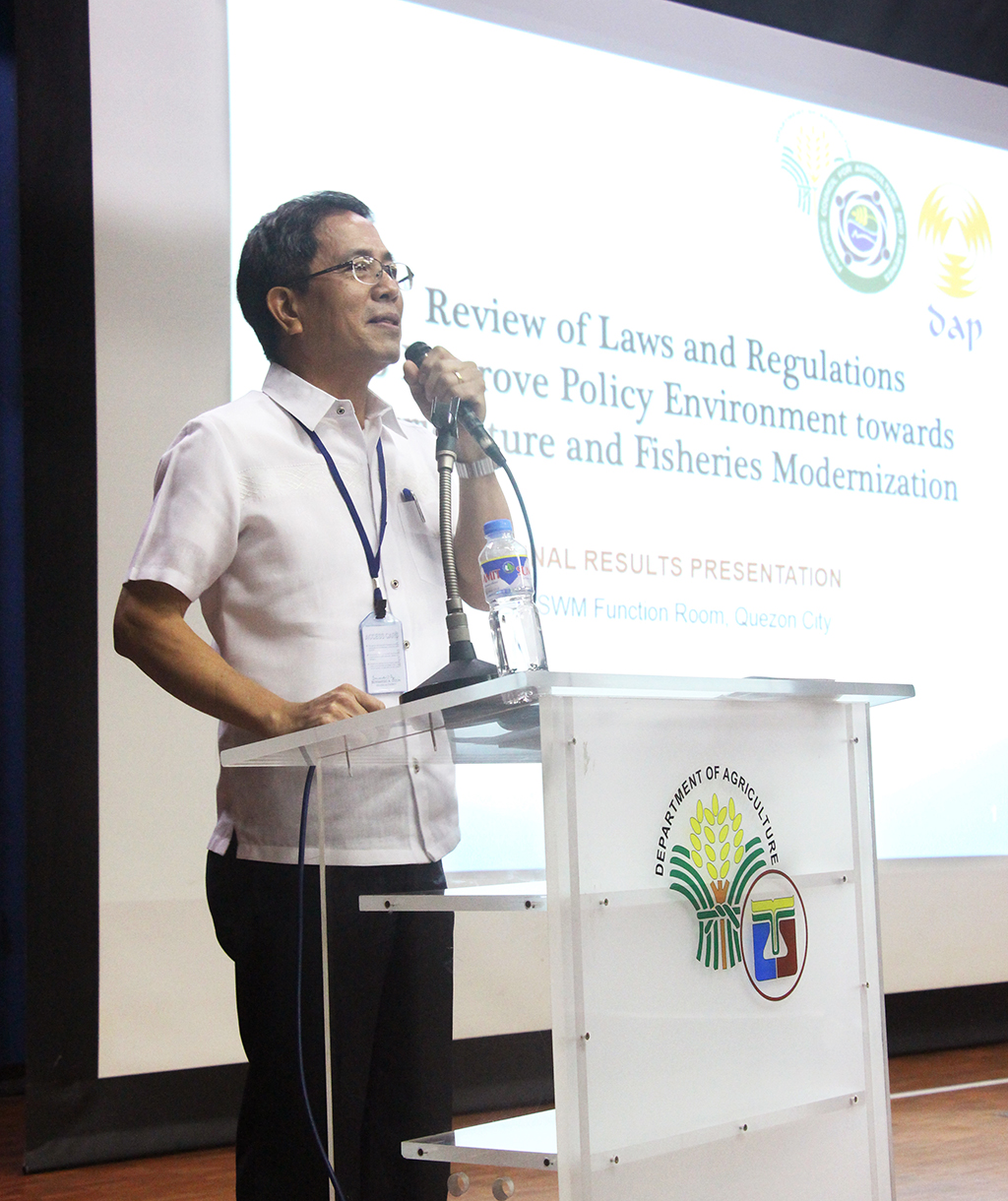
A study commissioned by the Philippine Council for Agriculture and Fisheries (PCAF) to the Development Academy of the Philippines (DAP) recently revealed that the unnecessary regulatory burden affects the ease of doing business in the agriculture and fishery sector.
According to the study, businesses have to bear unnecessary regulatory burdens like duplication of requirements in securing licenses and permits that could have an impact in terms of cost, time, and complexity arising from overregulation.
To address this, the study suggests that DA must take action to cut the number of compulsory permits, and make more use of the information technology so that businesses can interact with government online.
The key findings and recommendations were presented to more than a hundred participants from the Department of Agriculture (DA) offices, its bureaus, and attached agencies on June 13, 2018 at the Bureau of Soils and Water Management.
Aside from a client-friendly regulatory environment that will attempt to simplify dealings with business and other entities, the study also suggests to modify protocols that could mean greater discretion to food businesses to manage traceability of produce.
This will facilitate the tracking of production, processing, and distribution stages, including importation and at retail.
The “Review of Laws and Regulations to enhance the Policy Environment towards Agriculture and Fisheries Modernization” was conducted from June 2016 to September 2017. DAP worked closely with the eight DA regulatory agencies (RAs), PCAF and its Advisory Special Bodies, and other organizations aligned with the agriculture and fishery sector.
DA regulatory agencies include the Bureau of Animal Industry, Bureau of Fisheries and Aquatic Resources, Bureau of Plant Industry, National Food Authority, National Meat Inspection Services, Philippine Coconut Authority, Philippine Fiber Industry Development Authority, and Sugar Regulatory Administration.

“We also consider looking at salient issues where we can draw some meaningful information to help advance the agriculture sector towards modernization, aside from just compiling,” said Arnel Abanto, DAP Vice President and Managing Director.
The evaluative study features mapping, profiling, analyzing and assessing selected Philippine agriculture and fishery laws and regulations.
The study is a product of PCAF’s effort to provide quality services to a nationwide network of private sector-led advisory special bodies at the national, regional, and local levels for the formulation of sound policies, plans and programs, and is aligned with DAP’s current modernizing government regularization program to improve the regulatory policy environment to accelerate the development of the agriculture and fishery sector.
Apart from qualitative assessment of the regulatory processes adopted by the selected regulatory agencies, DAP also recommended policy areas aimed towards improving the regulatory environment of the eight RAs.
However, DAP’s consultant Dr. Nerlita Manalili said that “sometimes we throw stones to regulatory agencies and to all other assisting us but we are not hooking ourselves as developing stakeholders to the industry, we are not doing anything. So let’s start from here.”
DA-Project Development Service Dir. Jane Bacayo also commented that self-regulation is the ultimate rule of the agencies.
“Sana darating ang panahon na ang gagawin nalang ng mga regulatory agencies ay i-review on how they can regulate theirselves, but malayo pa ang tatahakin natin because there is really a need to instill among themselves kung ano ang value ng compliance and assent of regulation,” he added.
The activity was part of the Knowledge Unloading Day of PCAF’s Knowledge Management Section (KMS). As a repository of the agency’s and Advisory Special Bodies’ knowledge, KMS’ unloading day aims to impart useful information to targeted audience.
Key findings and Recommendations
Aside from the unnecessary regulatory burdens, here are the key findings of the study.
- Some agencies experience issues of clashing or conflicting jurisdiction with other RAs, national government agencies, and lack of coordination among the agencies affecting the specific sector.
- Most of the RAs also have limited presence due to insufficient staff capacity and budgetary allocations, which hamper their ability to discharge their regulatory mandate or take on additional functions. It usually results to suffering of enforcement and monitoring.
- Connectivity with other regulatory agencies to facilitate processing clearance, permits, etc., will shift the burden of proof from the business sector to the regulator.
- There are some regulations lacking in complimentary support in the light of new laws and policies.
- Some of the RAs lack updated technology. This affect the delivery of their regulatory mandate or services, and the transfer of technology.
- There are good regulatory practices including indicators from similar economies that can be adopted by the Philippines.
Making use of the processes that effectively design rules, institute fair governance structures, empower institutional capacity, and employ scientific regulatory tools and consistent good regulatory practice, the study recommends the following:
- Well-articulated cross-functional and cross-product coordination processes, with active participation from all major sectoral and functional areas.
- Governance structures with broad presentation and involvement of important stakeholders.
- Robust regulatory monitoring processes to keep an eye on changes and have these addressed by the appropriate parties in a timely manner.
- Consistent processes to document information and ownership, with accurate traceability and a proper audit trail.
- Scalable tools and processes that can be phased throughout the regulatory landscape.
- Regulatory change resources with empowered personnel, to help support compliance, legal and business areas.
- International Obligations. Engaging multilaterally informs the country of regulatory practice and can improve regulatory outcomes.
- Change management processes to sustain regulatory gains.
– JC











